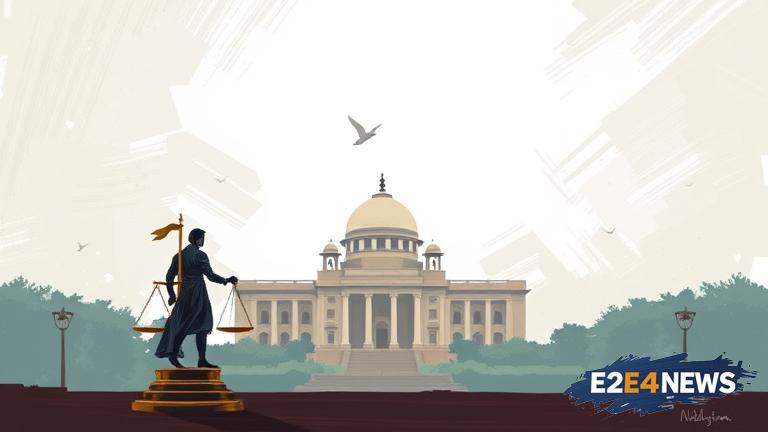In a shocking revelation, a judge from the National Company Law Appellate Tribunal (NCLAT) has alleged that there is pressure on the judiciary, which could potentially compromise the independence of India’s legal system. The judge, who wishes to remain anonymous, has stated that they have been facing pressure from various quarters, including the government and other external forces. This has led to a growing concern among the legal fraternity about the ability of the judiciary to function independently. The NCLAT is a key institution in India’s legal system, responsible for hearing appeals related to company law and insolvency. The allegations made by the judge have sparked a debate about the need to protect the independence of the judiciary. The Indian Constitution guarantees the independence of the judiciary, which is essential for upholding the rule of law and ensuring that justice is delivered fairly and impartially. However, the allegations made by the NCLAT judge suggest that this independence is under threat. The judge has alleged that they have been approached by various individuals and groups, who have attempted to influence their decisions. This has created a sense of fear and intimidation among judges, which could impact their ability to deliver justice fairly. The Indian government has been criticized for its handling of the judiciary, with many accusing it of attempting to exert control over the legal system. The NCLAT judge’s allegations have added fuel to this fire, with many calling for greater protection for the judiciary. The legal fraternity has come out in support of the judge, with many expressing concern about the impact of external pressure on the judiciary. The Bar Council of India has stated that it will investigate the allegations and take necessary action to protect the independence of the judiciary. The Indian Supreme Court has also been approached to intervene in the matter and ensure that the judiciary is able to function independently. The allegations made by the NCLAT judge have sparked a wider debate about the need for judicial reforms in India. Many have called for greater transparency and accountability within the judiciary, as well as measures to protect judges from external pressure. The Indian government has announced that it will set up a committee to investigate the allegations and make recommendations for reform. However, many are skeptical about the government’s intentions, given its track record on judicial independence. The NCLAT judge’s allegations have also sparked concerns about the impact on India’s economy and business environment. The NCLAT plays a critical role in resolving company law disputes, and any perception of bias or external influence could undermine confidence in the legal system. This could have a negative impact on foreign investment and economic growth, as investors may view the Indian legal system as unpredictable and biased. The Indian government has attempted to downplay the allegations, stating that they are isolated and do not reflect a wider trend. However, many are unconvinced, given the growing number of reports about external pressure on the judiciary. The NCLAT judge’s allegations have highlighted the need for greater vigilance and protection for the judiciary, to ensure that it is able to function independently and deliver justice fairly. The Indian legal system is at a crossroads, and the outcome of this controversy will have significant implications for the country’s democracy and rule of law. The international community is also watching the situation closely, with many expressing concern about the potential impact on India’s reputation as a democratic and law-abiding nation. The United Nations has stated that it is monitoring the situation and will take necessary action to protect the independence of the judiciary. The European Union has also expressed concern, stating that the allegations made by the NCLAT judge are a threat to the rule of law and democracy in India. The Indian government must take immediate action to address the allegations and ensure that the judiciary is able to function independently. This includes implementing measures to protect judges from external pressure, as well as increasing transparency and accountability within the judiciary. The Indian people are also demanding action, with many taking to the streets to protest against the perceived erosion of judicial independence. The controversy surrounding the NCLAT judge’s allegations has sparked a wider debate about the need for judicial reforms in India, and the importance of protecting the independence of the judiciary.
